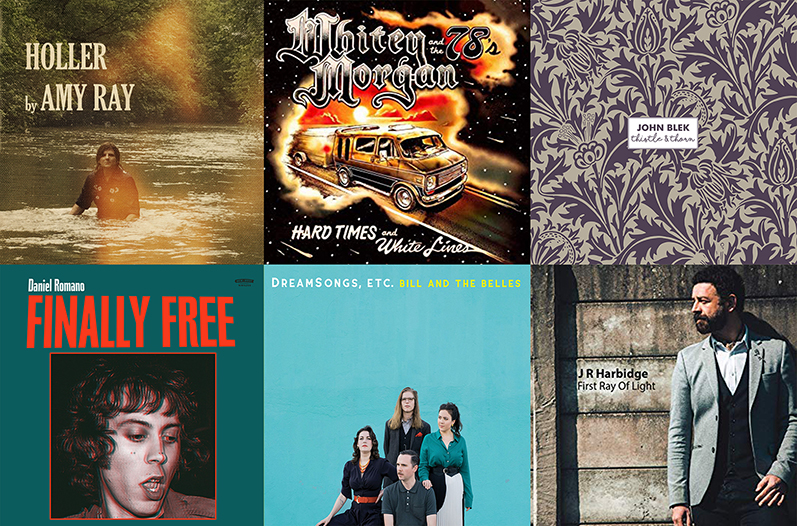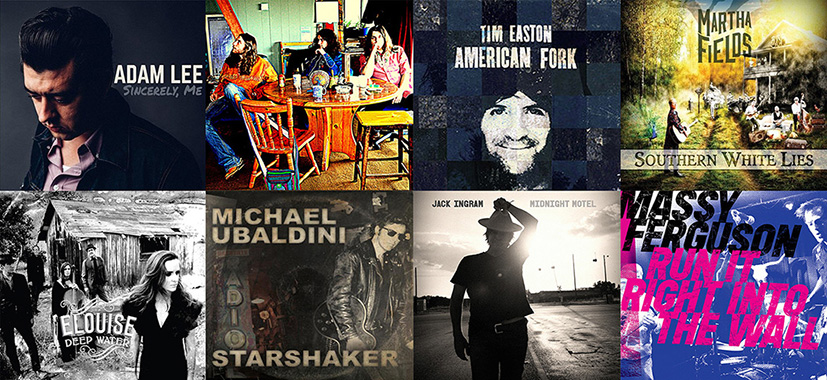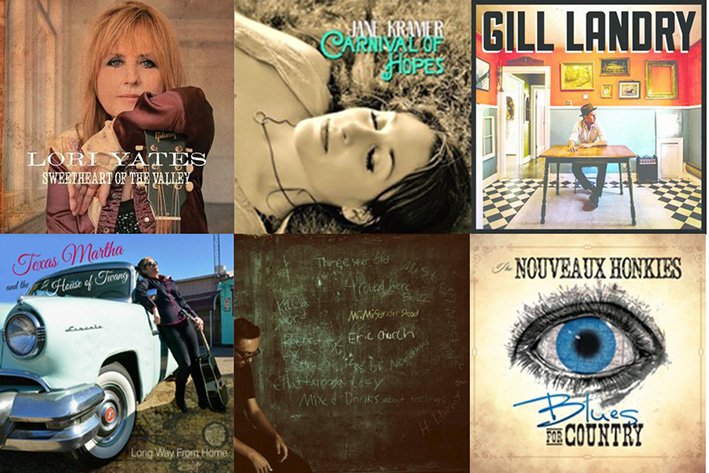
Hadley McCall Thackston Self-Titled Wolfe Island
Every so often an album comes your way by an artist new to you that stops you dead in your tracks. This was very much the case, after a couple of spins, with Hadley McCall Thackston’s debut self-titled album. Comprising ten tracks and at marginally over thirty minutes, Thackston could have been tempted to include a few covers, or add a couple more choruses to a few of the shorter tracks to increase the length of the album. Fortunately, she declined, instead creating a body of work that is unconditionally her, warts and all, with lyrics which often carry personal messages. It’s a beautifully written account of a young woman’s coming of age, with reflections on childhood, insecurity, adolescence, peer pressure, self-doubt and reconciliation.
Thackston had intended packing her bags and moving from her hometown of Decatur Georgie to the bright lights of Nashville, in an attempt to establish her musical career. By happy chance Hugh Christopher Brown, of Wolfe Island Records, was introduced to her music by label mate David Corley and without delay redirected the Greyhound Bus from Nashville to Wolfe Island Ontario. The move was a meeting of minds, introducing Thackston to a musical family and environment perfectly suited to inspire her creativity. Much credit must go to Chris Brown for the uncluttered arrangements on the album, which complement Theakston’s gorgeous voice. The range of instruments used totals over twenty, from strings to guitars and accordion to ukuleles, an indication of Brown’s determination to make every track on the album shine individually, a task he passed with flying colours. The recording in the main took place at The Post Office in Wolfe Island Ontario with additional recordings at Sacred Heart of Mary Church also in Wolfe Island and at Broderick’s Music in Kilkenny, where Ger Moloney’s accordion pieces were recorded.
The word ‘timeless’ is possibly the most overused phrase in folk and country album reviews, but this album most certainly earns that banner. Thackston manages to blend old time country and folk, contemporary and even bits of jazz. Her vocals are from another world, with the ability to stretch one syllable words forever, she manages seven syllables on the word ‘God’ on the beautiful Redbird!
Her mellifluous vocals on the opener Butterfly considers the fragility of the young child growing up in a world of mixed messages and peer pressures (‘’and you are not afraid to fly wide pride, accepting all the joy your beauty brings’’). Somehow, awash with divine pedal steel, fiddle and strings, fantasises about the dream lover yet to be met (‘’And on the day we finally meet I know we’ll fall in love, cuz you were put here on this earth for me from those above’’). Self-consciousness and insecurity surface on the melodically upbeat Ellipses, hitting a catchy groove that’s hard to shake off, as Thackston yearns for courtship (‘’ I’d take your sweet nothings for over diamonds any day, like the magpie who adorns her nest with treasures thrown away’’). She turns her attention to more worldly issues on the politically charged Change (‘’turn on the news and what do I see, another black man’s life cut short by the police’’). Wallace’s Song (Sage Bush) is traditional front porch country fare, complemented by lively fiddle playing by James Abrams and backing vocals by label mate Sarah Mc Dermott. Devil or Angel flawlessly blends folk with a quite jazzy vocal delivery. Last Mountain Waltz, the albums closer, returns to the front porch with a gentle tale of liberation and acceptance. It does not quite reach the two-minute mark but makes its point charmingly in four short verses.
Hadley McCall Thackston has created an album that sounds like a June Carter and Amy Winehouse collaboration, written and recorded in heaven and communicated through a young artist whose vocals and poetry pay homage to both of these legends.
Israel Nash Lifted Loose
Barn Doors & Concrete Floors, the classic 2011 release by Israel Nash Gripka, recorded in a dusty hay barn at The Catskill Mountains in upstate New York, singled out the young Ozarks Missouri born artist as one of the most promising emerging acts of that time, further reinforced by his dazzling live shows. The album ticked all the Americana boxes with Southern soul, blues, country and lots of attitude. The tracks Baltimore and Goodbye Ghost are as good as anything written under the Americana genre in the past decade. A victim of his own success perhaps, Nash has failed somewhat to reach those lofty heights in subsequent recordings. Rain Plains (2013) and Silver Season (2015) followed, both receiving positive industry reviews, yet you could be forgiven for feeling that Israel Nash (he had dropped the Gripka by then), was avoiding risk taking with much of the material and sounding more and more like Neil Young & Crazy Horse on each recording.
Lifted, co-produced by Nash and Ted Young (Kurt Vile, The Rolling Stones), finds him in more experimental form and all the better for it. Recorded in his custom-built studio named Plum Creek Sound in Dripping Springs Texas, its mix of layered vocals, horns, strings, guitars and percussion, combine to produce his most impressive work since Barn Doors. File under ‘Hippie Spiritual’, we are advised on the cover. With the ongoing turmoil of these uncertain and often depressing times, when all normal political and environmental logic is turned on its head, Nash has, by his own admission, has moulded an album ‘about love and peace and purpose, creating a space for those feelings and personal reflections to manifest’.
So does it all work? The answer has to be spectacularly so. The material was created by Nash from first principals, word by word, note by note, layer by layer, with Nash even utilising outdoor sounds of frogs, crickets, rattlesnakes and running water. Rolling On (Intro) kicks the album off with sixty seconds of a layered sound collage before exploding into the track itself, setting the scene for what is to follow. Spiritfalls sounds like a song you’ve grown up listening to, echoes of Neil Young minus Crazy Horse, it’s beautifully paced and decorated with some great guitar breaks. Northwest Stars (Out Of Tacoma) must have been composed outdoors staring skywards, you can almost feel the cool night mist amongst its dreamy, hypnotic textures. Strong Was The Night and Looking Glass are reminders of Nash’s ability to also create the less swashbuckling and melodic, both being simple yet spacious ballads. The Widow, (is that the crickets I hear in the background?) dips and soars gloriously, Beach Boys quality harmonies beautifully dominating – the majority of the harmonies were created by Nash himself – a wall of sound with sparring harmonies, synths and dubbed over voices, combining without ever competing. Sweet Springs also recalls The Beach Boys with harmonies that would not have been out of place on Pet Sounds. Golden Fleeces threatens to bookend the album on a more sombre and gentle note, before unexpectedly erupting into chorus and continuing to dip and soar beautifully.
Make no mistake, it’s not an album that fully sinks in on first listen, there’s so much going on that repeated plays are required – on headphones ideally – to take on board the musical textures, gorgeous harmonies, bells, whistles, strings, horns and more. Nash was always going to eventually equal the dizzy heights of Barn Doors & Concrete Floors, it’s taken him a while but with Lifted he has finally nailed it.
Mike And The Moonpies Steak Night at the Prairie Rose Self Release
If ever an album title and its cover left you in no doubt what to expect when you pop the cd in your player, this nugget from Austin Texas bad boys most certainly does. Six dudes chewing the fat outside a Texas honky tonk bar, with a blazing trail of fire following lead man Mike Harmeir, as he strolls across the dirt track street. It captures the album’s content perfectly, the material itself being a blazing trail of rip roaring country music Texas style. Formed by Harmeier in 2007, it’s the fifth album by the Austin based Outlaw Country six-piece band, that also includes Preston Rhone on bass, Kyle Ponder on drums, Zachary Moulton on pedal steel, Catlin Rutherford on guitar and John Carbone on keys. They are essentially a touring band, knocking out close to two hundred shows a year, mostly around Texas and Oklahoma.
Barely over a minute into opener Road Crew and you get the message, rollicking pedal steel, guitars and keys kick in over Harmeir’s mischievous rantings (‘’ he sells the shirts he drives the van, he’s counting money with a left arm tan, he’s a rambler gambler he just quit drinkin’ and he’s on the road crew tonight’’). Might Be Wrong recalls early Mavericks, Beaches of Biloxi’s rhythm is borrowed from Elvis’s Suspicious Mind and Getting High at Home is classic Texan honky tonk, great playing and equally sassy lyrics (‘’I still put my boots on and ask the girls to dance, but now I spend a lot more time wearing sneakers and old sweat pants’’). Wedding Band and The Worst Thing track are no nonsense straight country and the title track (based on a Houston bar where Harmeir got a residency when in his teens), is a heartfelt ballad of a broken marriage and misspent youth, as the writer recalls childhood memories of sitting in the bar with his father listening to country cover bands.
Produced by Adam Odor (Reckless Kelly, Cody Canada, Raul Malo, Ben Harper), it was recorded in only five days at The Yellow Dog Studio in Wimberley Texas.
It’s likely that Mike and The Moonpies will remain a working live band, surviving by packing up the van and travelling the length and breadth of Texas and Oklahoma, possibly without establishing a foot hold elsewhere. Maybe this album will break new ground for them, maybe not, it certainly deserves to. In the meantime, this, for me, is real country music by real country players. Don’t expect to spend endless hours pouring over the lyrics, regaling as they are. Instead just crank it up and navigate some rip roaring, badass, no nonsense, dive bar country music. File beside Dallas Moore, Whitey Morgan, Reckless Kelly, Whiskeydick and Jamey Johnson.
Sons Of Bill ‘OH GOD MA’AM’ Loose Records
Four years after the release of their last and fifth album Love And Logic, the Charlottesville Virginia band Sons Of Bill, have finally managed to release their eagerly awaited follow up. Plagued by personal issues, which included marriage breakdowns and addictions, the band – which features brothers Sam, Abe and James Wilson – overcame those setbacks and were in the studio recording the album, when James fell on glass, severing five tendons in his right hand, an injury that threatened to leave him without any movement in his fingers. Fortunately, after a long period of recuperation, he regained the use of all fingers and the album could be completed.
Tragedy often leads to inspiration and all these wretched events contribute to a change in direction for the band, both musically and lyrically. Recorded in both Nashville and Seattle with producers Sean Sullivan (Sturgill Simpson) and Phil Eek (Shins, Fleet Foxes), the album experiments with a fuller and more expansive sound, without abandoning their trademark striking vocal harmonies. The album was mixed by Grammy Award winning producer Peter Katis, who leaves his stamp firmly on it, with a sound that often brings to mind early work by The National. No coincidence, as Katis has worked on seven of The National’s albums, contributing in no small manner to their distinctive sound.
The opening track Sweeter, Sadder, Farther Away contains only keyboard and vocals, a reflection of more innocent times perhaps, very much the calm before the storm. Firebird ’85, the next track, takes off in a completely different direction with a heavy drum beat, some slick hooks and crisp harmonies. The intro to Believer / Pretender wouldn’t be out of place on an early New Order album, but like its predecessor quickly settles into an infectious power poppy groove. Green To Blue, the most uncluttered track on the album, has an earthy Pink Floyd sound to it and competes with Before The Fall as the standout track on the album. Easier finds them slipping back into cruising gear with a sound more in keeping with the work on their earlier albums.
Despite recording five quality albums to date and having praised heaped on them by their peers, a deserved breakthrough has escaped Sons of Bill to date. Hints at a change in direction did surface on their last album Logic and Love with Bad Dancer implying a more indie and less countrified direction. OH God Ma’am is a brave move, with more in common with New Order and Echo and The Bunnymen than Son Volt and possibly aimed at a wider audience. It may be a general change in direction or simply a temporary detour. Either way, it’s another great album by a band that should be shifting albums by the lorry load.
Martha Fields Dancing Shadows Self Release
Hot on the heels of her 2017 recording Southern White Lies, Martha Field’s latest album Dancing Shadows maintains her prolific output of recent years. Whether it’s country, folk, blues, Tex Mex or rockabilly that tickles your fancy, there really is something for all tastes in this strikingly packaged gem.
It kicks off with the bluesy Sukey and tails off with the breezy Lone Wolf Waltz, fourteen tracks and over fifty-five minutes later. Recorded at Studio Recordoval in Chateauneuf – Sur – Charante France, it features musicianship that could hardly be bettered by the cream of Nashville session players. The musicians are in fact her European touring band, made up of Ubain Lambert on guitars, Serge Samyn on upright bass, Oliver Leclerc on violin, Danis Bielsa on drums, Manu Bertrand on dobro, pedal steel and banjo with Manu Godard and Vincent Samyn adding organ and piano respectively. Collectively these guys provide the ammunition to bring Field’s suite of songs to life and combine perfectly with her potent vocals across the fourteen tracks. ‘’14 songs that tell my story, past and present, through the mountains and valleys’’, she explains in the liner notes and it’s fair to say she pours her heart out from start to finish.
Not surprisingly, given her itchy feet – she seems to be constantly on the move – quite a few tracks are travel related. The burning desire to play Ireland is the theme on Exile and Paris to Texas – the first single to be released from the album – laments the distance between her two homes. West Virginia In My Bones, delivered with maximum twang, pays homage to the lands of her childhood where she vows to return (‘’when I die bring me home, West Virginia in my bones’’) and the gentle ballad Oklahoma On My Mind aches with regret, possibly of love lost. Last Train to Sanesville and Hillbilly Bob are pacey toe tappers rocking along late 50’s Elvis style.
In a nutshell, Dancing Shadows is a fun album that is every bit as much Saturday night as Sunday morning listening, by an artist passionate about her art. Lets hope she makes that trip to Ireland, I’d expect she and her band are killer live!
Ben Glover Shorebound Proper
Recognising that the local market could not offer him a sustainable career from his hometown of Glenarm Ballymena, Ben Glover headed for Nashville a few years ago where he has established himself as a highly respected songwriter, working with artists such as Mary Gauthier, Gretchen Peters and Neilson Hubbard. His songwriting talents were recognised in 2017, at the highest level, when The Americana Music Association voted his co-write with Gretchen Peters Blackbirds International Song of The Year.
Indeed the move has been a transformation for Glover, who now divides his time between Ireland and Nashville, co-writing, collaborating, and recording solo albums and working with his latest band Orphan Brigade, whose album Heart Of The Cave was recorded earlier this year. His work on both sides of the Atlantic is reflected on Shorebound, which includes contributions from American’s Amy Speace, Gretchen Peters, Kim Richey, Mary Gauthier, Neilson Hubbard and Angel Snow together with Robert Vincent, Ricky Ross (Deacon Blue) from the U.K., with Irish artists Malojian (Steve Scullion), Matt McGinn and Anthony Toner also featuring.
Produced by Neilson Hubbard – he also features on Song for the Fighting – the album offers twelve songs, ten co-writes with the guests noted above, with two solo tracks also featured, the title track and Kindness. What You Love Will Break Your Heart opens the album in fine style, an upbeat poppy sound featuring Amy Speace on backing vocals, contrasting in style and content with the darker brooding semi spoken Catbird Seat, co-written with Mary Gauthier. Dancing With The Beast, the next track, was also recorded earlier this year by Gretchen Peters and is the title of her most recent album, it follows a similar menacing and grim style and is every bit as impressive as the Peter’s version. Northern Stars, which finds Glover teaming up with fellow countrymen Malojian (Stephen Scullion) and Matt Mc Ginn, is instantly catchy. Keeper Of My Heart, which bookends the album, is a gorgeous love song, possibly the albums stand out track, with Glover’s and Robert Vincent’s vocals perfectly matched.
Glover’s previous two albums The Emigrant (2016) and Atlantic (2014), suggested an artist not quite convinced where he should reside, both geographically and artistically. Shorebound is the work of an artist content, assured and very much at peace with himself.


